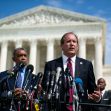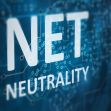On Thursday, a U.S. appeals court blocked the Federal Communications Commission's (FCC) attempt to reinstate net neutrality rules, siding with broadband providers in their legal challenge. The Sixth Circuit U.S. Court of Appeals temporarily halted the FCC's April decision to reassume regulatory oversight of broadband internet and reinstate open internet rules first adopted in 2015.
The court's decision, which delays the implementation of net neutrality regulations, comes as a blow to efforts to ensure that internet service providers (ISPs) treat all data and users equally. The FCC's move had aimed to prevent ISPs from restricting access, slowing speeds, or blocking content for certain users and forbidding paid prioritization of lawful content.
"The final rule implicates a major question, and the commission has failed to satisfy the high bar for imposing such regulations," the court wrote in its decision. "Net neutrality is likely a major question requiring clear congressional authorization." The court scheduled oral arguments for late October or early November to further address the issue.
FCC Chair Jessica Rosenworcel expressed disappointment at the ruling, stating, “The American public wants an internet that is fast, open, and fair. Today’s decision by the Sixth Circuit is a setback, but we will not give up the fight for net neutrality.”
Net neutrality rules have been a contentious topic, with strong opinions on both sides. Proponents argue that such rules are essential to maintain a free and open internet, ensuring that ISPs cannot manipulate internet traffic to benefit certain sites or services. Critics, however, contend that these regulations stifle innovation and deter investment in network infrastructure.
Net neutrality was first adopted in the United States in February 2015. The Federal Communications Commission (FCC), under the leadership of then-Chairman Tom Wheeler, voted to reclassify broadband internet service as a telecommunications service under Title II of the Communications Act of 1934. This reclassification enabled the FCC to impose stricter regulations on internet service providers (ISPs) to ensure they treated all internet data equally.
The 2015 Open Internet Order included key provisions such as:
1. No Blocking: ISPs were prohibited from blocking access to lawful content, applications, services, or non-harmful devices.
2. No Throttling: ISPs were forbidden from impairing or degrading lawful internet traffic on the basis of content, applications, services, or non-harmful devices.
3. No Paid Prioritization: ISPs were not allowed to engage in paid prioritization, meaning they couldn't create "fast lanes" for internet traffic in exchange for payment.
These rules aimed to preserve the open nature of the internet and prevent ISPs from discriminating against certain types of content or services. Net neutrality supporters argued that these protections were essential to maintaining a level playing field for all internet users and content providers, fostering innovation, and protecting free expression.
However, the net neutrality rules faced significant opposition from ISPs and conservative lawmakers, who argued that the regulations were overly burdensome and hindered investment in broadband infrastructure. In December 2017, under the Trump administration and FCC Chairman Ajit Pai, the FCC voted to repeal the 2015 net neutrality rules, arguing that they were unnecessary and harmful to investment and innovation.
The repeal of net neutrality rules sparked widespread debate and legal challenges, leading to ongoing efforts by net neutrality advocates and some lawmakers to restore the protections.
Reinstating net neutrality has been a priority for Biden, who signed an executive order in July 2021 urging the FCC to restore the rules implemented under former President Barack Obama. The Trump administration had repealed these rules, claiming they were unnecessary and hindered technological advancements.
The appeals court's temporary block follows a previous order on July 12 that paused the net neutrality rules until August 5, giving the court time to consider industry challenges.
The blocked rules would not only prevent ISPs from engaging in discriminatory practices but also empower the FCC to monitor internet service outages and crack down on Chinese telecom companies. The legal battle now shifts to the scheduled oral arguments later this year, where the fate of net neutrality rules will be further contested.






